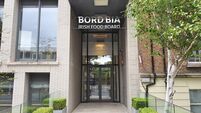The slow road to broadband
While government sources talk of the cloud computing industry being worth €9.5 billion here in a few years, employing up to 9,000, many farmers have to ask friends, family members or agents such as solicitors to help them when they need to access relevant websites to fill in forms online.
The onwave satellite broadband company spoke to 80 people at the Ploughing Championships, and 50 of them had no internet access on their farm or in their home, and 16 were still on slow dial-up or narrowband services.













